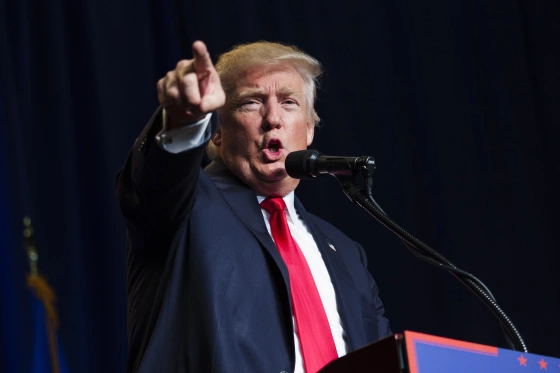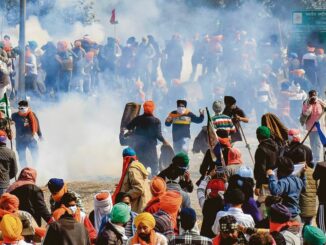

The president punished the AP for choosing its own language, but that’s just the tip of the iceberg. The press must show unity. It might seem like a small matter, just a disagreement over whether a body of water should be called one name or another. But it’s really about much bigger things: Trump-style intimidation, a clear violation of the first amendment – and the extent to which news organizations will stick together in each other’s defense, or will comply with the powerful for the sake of their own access.
Even more broadly, it is about Donald Trump’s wide-ranging effort to control the media and be able to spread propaganda and interfere with the flow of accurate information.
The disagreement started soon after the president decided unilaterally that the Gulf of Mexico was to be called the Gulf of America. The executive order was one more display of Trump’s capricious and imperious way of doing things; his first month has been a relentless exercise in chaos and norm-destruction.
After the Associated Press, the global news organization, decided to stick with using the long-established name which makes sense to its international readership, the Trump White House determined that punishment was in order.
An AP reporter was barred from a White House press event, and since then, things have only escalated. More AP reporters barred from briefings and from the president’s plane. Access denied.
What’s happening is ugly. In the US, the government doesn’t get to dictate the language journalists use in their stories. There’s a little thing called the first amendment to the US constitution that prohibits this. But the Trump administration, as usual, has its own – often unconstitutional and sometimes illegal – ideas.
The actions against the AP are “retribution, plain and simple, and a shameful attempt to bully the press into ideological compliance”, said Tim Richardson of PEN America.
On Thursday, the Reporters Committee for Freedom of the Press sent a letter to the White House signed by 30 news organizations, and the White House Correspondents Association is similarly registering its displeasure.
But letters – even signed by many and ever so strongly worded – are easy to ignore. The solution, if there is one, will require more forceful measures: lawsuits and journalistic solidarity that might include a widespread boycotting of White House press briefings.
After all, compliance is a slippery slope. What happens, for example, when Trump proclaims that Ukraine is no longer Ukraine, but to be simply called Russia? Do news organizations politely accept the rewriting of history?
“What do the media do then,” queried the longtime environmental journalist Andrew Revkin, “agree to those terms so they can stay in the briefing room?”
Why stop there? How about declaring by fiat that the Washington monument is now to be called the Trump monument? Why not chisel another presidential face onto Mount Rushmore and call it Mount Donald?
The great renaming has begun, and George Orwell would understand exactly what’s going on.
A few days ago, a media leader I admire – Jim Friedlich, the CEO of the Lenfest Institute, a non-profit organization that owns the Philadelphia Inquirer – proposed a notion that deserves serious consideration. There should be, he wrote, a “NATO for News,” in which every legitimate news organization formally pledges to defend the others. This happens now, from time to time, but Friedlich has something more deliberate in mind, he wrote in the Inquirer.
All of this is happening within a larger and quite alarming anti-press context.
Trump’s sidekick Elon Musk recently fantasized about a “long prison sentence” for journalists on CBS’s 60 Minutes, which has been under fire for its (normal and conventional) editing of a pre-election interview with Kamala Harris.
Trump has sued the Pulitzer prize board for statements in defense of its awards to the Washington Post and the New York Times for their coverage of Trump’s relationship with Russia; he’s sued the Des Moines Register over a pre-election public opinion poll. And the Pentagon recently tossed eight traditional news organizations from office spaces to make room for pro-Maga outlets.
“The Trump administration has decided that it will actively wield access as a tool to reshape the media landscape in its favor,” Oliver Darcy wrote in his media newsletter, Status. It surely will also use more legal threats and actions.
Given that we’re only a month into this brave new world, some unity and stiff-spined resolve are very much in order.
That won’t be easy. Getting journalists together is like herding pigeons. And no journalist wants to lose access to sources and to being where news is made. But in this era, it couldn’t be more important to push back hard.
The free press may be going down, but if so, we should go down swinging.
(Margaret Sullivan is a Guardian US columnist writing on media, politics and culture)




Be the first to comment